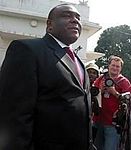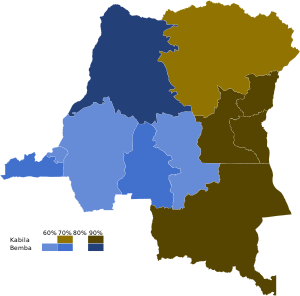
Politics of the Democratic Republic of Congo take place in a framework of a republic in transition from a civil war to a semi-presidential republic.
The Armed Forces of the Democratic Republic of the Congo is the state organisation responsible for defending the Democratic Republic of the Congo. The FARDC was rebuilt patchily as part of the peace process which followed the end of the Second Congo War in July 2003.

The Democratic Republic of the Congo is a country in Central Africa. By land area, the DRC is the second-largest country in Africa and the 11th-largest in the world. With a population of around 112 million, the Democratic Republic of the Congo is the most populous Francophone country in the world. The national capital and largest city is Kinshasa, which is also the economic center. The country is bordered by the Republic of the Congo, Central African Republic, South Sudan, Uganda, Rwanda, Burundi, Tanzania, Zambia, Angola, the Cabinda exclave of Angola, and the South Atlantic Ocean.

Joseph Kabila Kabange is a Congolese politician who served as President of the Democratic Republic of the Congo between January 2001 and January 2019. He took office ten days after the assassination of his father, President Laurent-Désiré Kabila in the context of the Second Congo War. He was allowed to remain in power after the 2003 Pretoria Accord ended the war as the president of the country's new transitional government. He was elected as president in 2006 and re-elected in 2011 for a second term. Since stepping down after the 2018 election, Kabila, as a former president, serves as a senator for life.

The Second Congo War, also known as Africa's World War or the Great War of Africa or the Great African War, began in the Democratic Republic of the Congo in August 1998, little more than a year after the First Congo War, and involved some of the same issues.

The United Nations Organization Stabilization Mission in the Democratic Republic of the Congo or MONUSCO, an acronym based on its French name Mission de l'Organisation des Nations Unies pour la stabilisation en République démocratique du Congo, is a United Nations peacekeeping force in the Democratic Republic of the Congo (DRC) which was established by the United Nations Security Council in resolutions 1279 (1999) and 1291 (2000) to monitor the peace process of the Second Congo War, though much of its focus subsequently turned to the Ituri conflict, the Kivu conflict and the Dongo conflict. The mission was known as the United Nations Mission in the Democratic Republic of Congo or MONUC, an acronym of its French name Mission de l'Organisation des Nations Unies en République démocratique du Congo, until 2010.

Étienne Tshisekedi wa Mulumba was a Congolese politician and the leader of the Union for Democracy and Social Progress (UDPS), the main opposing political party in the Democratic Republic of the Congo (DRC). A long-time opposition leader, he served as Prime Minister of the country on three brief occasions: in 1991, 1992–1993, and 1997. He was also the father of the current President, Felix Tshisekedi.
The Movement for the Liberation of the Congo is a political party in Democratic Republic of the Congo. Formerly a rebel group operating in the Democratic Republic of Congo that fought the government throughout the Second Congo War, it subsequently took part in the transitional government and is one of the main opposition parties.

Antoine Gizenga was a Congolese (DRC) politician who was the Prime Minister of the Democratic Republic of the Congo from 30 December 2006 to 10 October 2008. He was the Secretary-General of the Unified Lumumbist Party.

Jean-Pierre Bemba Gombo is a politician in the Democratic Republic of the Congo (DRC). He has served as Deputy Prime Minister of Defense since 2023. He was previously one of four vice-presidents in the transitional government of the Democratic Republic of the Congo from 17 July 2003 to December 2006. He led the Movement for the Liberation of the Congo (MLC), a rebel group turned political party. He received the second-highest number of votes in the 2006 presidential election. In January 2007, he was elected to the Senate.

Gubernatorial elections were held in the Democratic Republic of the Congo on 27 January 2007, though they were originally scheduled for 16 January and 19 January. The governors and vice-governors were chosen through indirect election by the members of the provincial assemblies; the delay was a result of the difficulties in choosing traditional chiefs to fill the places reserved for them in the provincial assemblies. The second round of voting would only have been necessary in those cases where no candidate had received an absolute majority in the first round, which was not the case anywhere. However, voting was rescheduled in Kasai-Occidental and Kasai-Oriental on 10 February to 15 February, because the Union of the Nation candidates were disqualified because they held dual citizenship.
Congolese history in the 2000s has primarily revolved around the Second Congo War (1998–2003) and the empowerment of a transitional government.

The Kivu conflict is an umbrella term for a series of protracted armed conflicts in the North Kivu and South Kivu provinces in the eastern Democratic Republic of the Congo which have occurred since the end of the Second Congo War. Including neighboring Ituri province, there are more than 120 different armed groups active in the eastern Democratic Republic of Congo. Currently, some of the most active rebel groups include the Allied Democratic Forces, the Cooperative for the Development of the Congo, the March 23 Movement, and many local Mai Mai militias. In addition to rebel groups and the governmental FARDC troops, a number of national and international organizations have intervened militarily in the conflict, including the United Nations force known as MONUSCO, and an East African Community regional force.

In areas of the Democratic Republic of the Congo, the human rights record has remained considerably poor, and serious abuses have been committed. Unlawful killings, disappearances, torture, rape, and arbitrary arrest and detention by security forces increased during the year, and the transitional government took few actions to punish harsh people. Harsh and life-threatening conditions in prison and detention facilities; prolonged pretrial detention; lack of an independent and effective judiciary; and arbitrary interference with privacy, family, and home also remained serious problems. Security forces continued to recruit and retain child soldiers and to compel forced labour by adults and children.

Denis Kalume Numbi is a general and a politician in the Democratic Republic of the Congo (DRC). He was part of the Antoine Gizenga government as Minister of State for the Interior, Decentralization and Security. He was replaced in this position on 26 October 2008 by Celestin Mbuyu Kabango when the government headed by Adolphe Muzito was formed.

The National Congress for the Defence of the People is a political armed militia established by Laurent Nkunda in the Kivu region of the Democratic Republic of the Congo in December 2006. The CNDP was engaged in the Kivu conflict, an armed conflict against the military of the Democratic Republic of the Congo. In January 2009, the CNDP split and Nkunda was arrested by the Rwanda government. The remaining CNDP splinter faction, led by Bosco Ntaganda, was planned to be integrated into the national army.
Laurent Nkunda is a former General in the Armed Forces of the Democratic Republic of Congo (DRC) and is the former warlord operating in the province of Nord-Kivu, sympathetic to Congolese Tutsis and the Tutsi-dominated government of neighbouring Rwanda. Nkunda, who is himself a Congolese Tutsi, commanded the former DRC troops of the 81st and 83rd Brigades of the DRC Army. He speaks English, French, Swahili, Kinyarwanda, Lingala and Kinande. On January 22, 2009, he was put under house arrest in Gisenyi when he was called for a meeting to plan a joint operation between the Congolese and Rwandan militaries.
The Congolese Rally for Democracy–Goma was a faction of the Congolese Rally for Democracy, a rebel movement based in Goma, Democratic Republic of the Congo (DRC) during the Second Congo War (1998–2003). After the war, some members of the group continued sporadic fighting in North Kivu. The movement also entered mainstream politics, participating in democratic elections with little success.
The Land Forces, also called the Congolese Army, are the land warfare component and the largest branch of the Armed Forces of the Democratic Republic of the Congo (FARDC).

General elections were held in the Democratic Republic of the Congo on 30 December 2018, to determine a successor to President Joseph Kabila, as well as for the 500 seats of the National Assembly and the 715 elected seats of the 26 provincial assemblies. Félix Tshisekedi (UDPS) won with 38.6% of the vote, defeating another opposition candidate, Martin Fayulu, and Emmanuel Ramazani Shadary, backed by the ruling party PPRD. Fayulu alleged that the vote was rigged against him in a deal made by Tshisekedi and outgoing President Kabila, challenging the result in the DRC's Constitutional Court. Different election observers, including those from the country's Roman Catholic Church, also cast doubt on the official result. Nonetheless on 20 January the Court rejected his appeal and declared Tshisekedi as the winner. Parties supporting President Kabila won the majority of seats in the National Assembly. Félix Tshisekedi was sworn in as the 5th President of the Democratic Republic of the Congo on 24 January 2019, making it the first peaceful transition of power in the country since it became independent from Belgium in 1960.


















